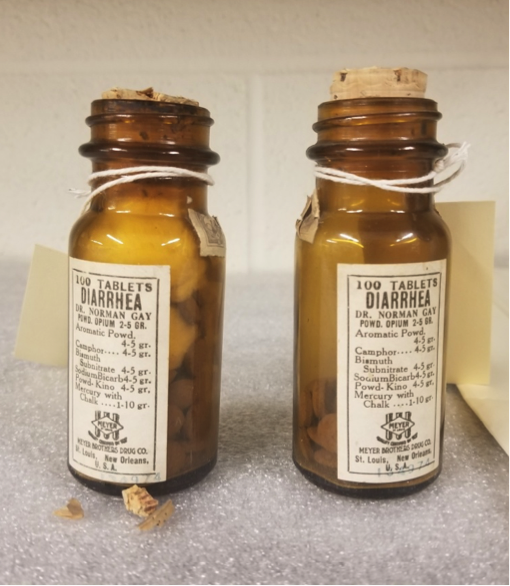Story
The DEA comes to History Colorado Center
Working in a history museum, you run across some very interesting items in the collection. Some of them make you question their safety.
Think of lead paint on houses, asbestos insulation, radium-painted toys and watches that glow in the dark, and medicines. History museums, especially ones that have been in operation for a long time—History Colorado was established in 1879—have been collecting objects that were not a safety concern in their own time, but are considered hazardous today.
As part of my position as the Assistant Registrar, when a new donation comes in I evaluate it to make sure History Colorado will be able to legally own the objects. Practicing caution is necessary, especially when it comes to historic medical collections.
A large donation from the Speck family was given to History Colorado earlier this year. Dr. Richard Speck (1886-1965) was a doctor practicing medicine in Southern Colorado during the early to mid 20th century. In his early career, Dr. Speck worked for the New Mexico Lumber Company, living in Edith, Colorado. In 1924 the company established the town of McPhee, about 14 miles outside of Dolores. From 1924 to 1944 Dr. Speck was the company doctor. Afterwards, he left the company and set up his practice in Cortez. He continued practicing medicine until his death in 1965.
In early 2019 Dr. Speck’s family donated his medical equipment and medicines he used while in practice. While sorting through the items, and preparing them to be accessioned into the collection, I discovered that there were a few bottles that still contained tablets. In the donation, there were two bottles of “Dr. Norman Gay Powdered Opium” for treatment of diarrhea.

Diarrhea tablets from the office of Dr. Richard Speck, 2019.19.54 and 2019.19.55
Looking closer at the tablets and the still-intact label, I realized that the bottles appeared to contain not just powdered opium but also “mercury with chalk.” Mercury was, before humans realized how dangerous it can be, a substance commonly found in thermometers, paint, hats, and many medicines used to treat a variety of illnesses and diseases. Opium, a controlled substance, is illegal in the state of Colorado and federally. Since the bottles were full of tablets and they contained not only mercury but opium, it would be considered illegal for the museum to posses these items.
For the purpose of preserving history, the value of these objects lies with the bottles themselves. The bottles and their intact labels demonstrate the type of medicine that was being administered during Dr. Speck’s medical career. They are a historical marker of medicine in Colorado. Their contents, on the other hand, lack value from this perspective.
So I contacted the federal Drug Enforcement Administration (DEA) to explain the situation. This was not the first time a museum, or even History Colorado, had worked with the DEA to ensure it was not violating any laws. I worked with the team of DEA agents to make sure all the substances from this donation were turned in, while keeping the bottles with the intent on accessioning them into the permanent collection.
I had to carefully remove the corks on the bottles for accessing the tablets. On one of the bottles the cork easily came off. Unfortunately for the second bottle, the cork was deteriorating to the point that it crumbled. The DEA agents came prepared to History Colorado with vials to transfer the tablets. The image below shows an agent carefully filling a vial with the substances.
Once the substances had all been removed from the bottles, the DEA packed them away to be disposed of. Working with the DEA, History Colorado used proper museum protocol to ensure that our collections are not only legal but also safe for staff, visitors, and other collection items. The bottles of diarrhea tablets are now permanent items in our collection, 2019.19.54 and 2019.19.55. For more information on these specific bottles and the rest of the recent Speck donation (2019.19), please visit our online collections page at h-co.org/collections.

